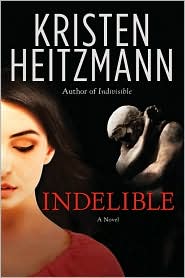Altared: The True Story of a She, a He, and How They Both Got Too Worked Up About We
By Eli and ClaireAltared instantly piqued my interest. How could it not? It stuck out like a sore thumb {or like a garden gnome in a desert}. It is revolutionary. Possibly offensive, perhaps flippant? It is a Christian book actually advocating for a less all-consuming, obsessive view of marriage. Now that's a book to pick apart and digest.
With a grain of salt, I
 Altared is co-authored by a young couple who wrote under the pseudonyms, "Eli" and "Claire". Throughout the book, they weave the re-telling of their own "love story". But in between remembrances of their long-distance relationship, they tell a deeper story - one that reverabates throughout the Christian community, seemingly growing stronger with passing generations and the uptick of romance novels: the all-consuming view of marriage.
Altared is co-authored by a young couple who wrote under the pseudonyms, "Eli" and "Claire". Throughout the book, they weave the re-telling of their own "love story". But in between remembrances of their long-distance relationship, they tell a deeper story - one that reverabates throughout the Christian community, seemingly growing stronger with passing generations and the uptick of romance novels: the all-consuming view of marriage.What? There is something wrong with the evangelical community's approach to marriage? It sounds strange. It may be offensive to some. But the arguments that Eli and Claire set forth are worth the contemplation. They cover a lot of ground in the book, and though I can not adequately express their extensive thoughts in a short blog post, I have included a few of their perceptions below.
1) Why do churches - all across America and throughout the denominations - nudge the singles in their congregations down the aisle? Why are singles the most marginalized group in the Church? Why is there an unsaid rule that singles aren't functioning members of the church (or community) until they are married?
Perhaps because the evangelical community is marriage-happy. Because it is assumed that every person should get married; that everyone should want to get married; that everyone, except for a finite few, will eventually get married; and, as such, everyone of marriageable age should get married ASAP, regardless of the bigger picture: The perfect will of God.
Eli and Claire back up their points with scripture, and reflect that perhaps we have gotten it all wrong - terribly wrong. Perhaps as a community, we have taken God's gift of marriage, and made the gift our god - singles and marrieds alike. Perhaps marriage and the pursuit of it has overwhelmed our thoughts, our desires, our questful thirst, our hearts unto a sinful amount.
Eli and Claire qualify that they do not disdain marriage or the God-given glory and beauty of the institution; they simply query if our motives for marriage are based in selfish desires or instead based in a heart duly surrendered unto God.
2) Is this marriage-happy state in the Christian community preventing believers from whole-heartedly and purposefully fulfilling God's command to love one's neighbor?
It's a big command {second only to loving the Lord}, and Eli and Claire note that the command should not become any less important when one becomes of marriageable age or becomes married. Perhaps our marriage-happy community has blurred the lines, and in the midst of loving one's family {a wonderful act in and of itself}, we have forgotten the enormous value of loving as a family unit. Perhaps in the pursuit for a spouse, Christian singles are neglecting numerous and constant opportunities to love their neighbor. Perhaps married Christians have come to see loving their spouse as their highest and most important duty before God, and thus they have casually thrown by the wayside the command to love one's neighbor. It's certainly food for thought.
3) Has the Christian community's approach to teaching the essence and holiness of purity been based on the wrong motives.
Eli and Claire point out {and I must agree based on the books I've read} that the Christian community has taught the youth to remain pure for their future spouse. Nothing wrong with that, but for the motive. Why be pure? So you can save yourself for you future spouse. What about instead preaching a purity based simply out of faithful obedience to God's command - future spouse or not. With this motive, the quest for purity no longer relies on man; it quells the waiting anxiety; it takes the impatient heart off of the hazy, unknown future spouse, and instead refocuses it to look towards God and His righteousness.
Eli and Claire include so many more thoughts and propositions in their book - each as thought-provoking as the last. Many readers may disagree with Eli and Claire; and to most, the content may sound distantly offensive - distantly, because they cannot put their finger on the discordant theme, but the subtle presence is there nonetheless. The offensive aura of the book may simply be rooted in the foreignness of the thoughts enclosed - the thoughts that just maybe God is less worked up about marriage than we are.
I received this book for free from WaterBrook Multnomah Publishing Group for this review, but the opinions expressed in this post are mine.


